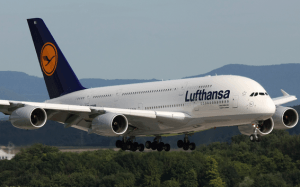Lufthansa sets new fuel efficiency record
 Airlines in the Lufthansa Group, have set a record for fuel efficiency of 3.84 litres of kerosene per 100 kilometres per passenger in 2014, representing an improvement of 1.6 per cent over the previous year.
Airlines in the Lufthansa Group, have set a record for fuel efficiency of 3.84 litres of kerosene per 100 kilometres per passenger in 2014, representing an improvement of 1.6 per cent over the previous year.
A statement issued in Accra by Lufthansa said as in previous years, the Group had met the demanding aerospace industry target of annual efficiency gains of 1.5 per cent.
It said this means all the passenger airlines in the Lufthansa Group such as Lufthansa, Swiss, Austrian Airlines and Germanwings have continued to improve their specific consumption values.
“The cargo aircraft of Lufthansa Cargo were also more efficient than ever, with 0.183 litres/tonne kilometres – an improvement of 5.2 per cent over 2013.
The statement said in 2014, Group-wide efficiency in cargo transportation was increased by 0.8 per cent and the absolute fuel consumption in the Group increased slightly by 0.7 per cent with an increase in transport capacity of 1.9 per cent.
It said Lufthansa foresaw further reduction of specific fuel consumption through the investment in new, more efficient and low-noise aircraft.
The statement said Lufthansa has now put the last of 19 Boeing 747-8 aircraft into service adding that these aircrafts are 15 per cent more fuel efficient than its predecessor model B 747-400.
“By 2025, the company will receive 272 aircraft at a list value of 38 billion Euros. This is the biggest fleet modernisation programme in the history of the Lufthansa Group. In 2015 alone, 17 aircraft will be delivered to the Group.”
The statement said the basis for further achievements in environmental performance is the four-pillar strategy established for climate protection, which combines different environmental measures.
In addition to numerous programmes for the more efficient use of the fuel resource, the Group is also focusing on the research and use of alternative, low-CO2 fuels.
It said the Lufthansa Group is also engaged in the electromobility initiative E-PORT AN at Frankfurt Airport, in order to make the taxiing and towing operations of aircraft more efficient through the use of electromobility and thus to reduce kerosene consumption and CO2 emissions on the ground.
Source: GNA
